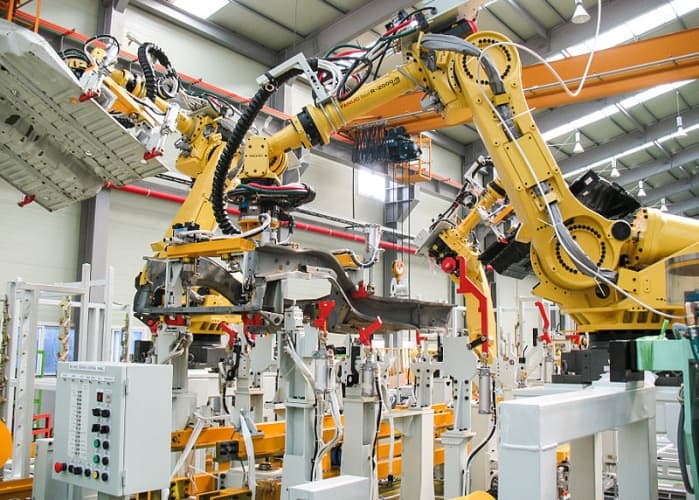Stephen Pithouse recently graduated from the University of Warwick with a First in engineering. Passionate about robotics from a young age, he worked with industrial automation firm FANUC during his time at Warwick, and has now taken up a full-time role at the company. The Student Engineer caught up with Stephen to find out about his journey.
What first drew you towards engineering and, more particularly, robotics?
I had always been interested in taking things apart, I spent countless hours playing with LEGO and K’NEX kits when I was younger, I learned not only how to make models, but how to make them strong and robust. I was 14 years old when the Warwick University Technology Volunteers visited my school and introduced me to the Arduino platform and basic electronics – which gave me skills suitable for robotics. I most enjoyed the ability to make creations do exactly what I wanted, to solve problems in a neat way.

Is robotics particularly challenging insofar as it draws from multiple engineering disciplines?
It goes without saying that the field of Robotics covers a wide range of engineering disciplines, most obviously; programming, electronics, CAD, and mechanics, and also more project-related skills. However, problem solving is a major requirement also as there are new technologies, methods and situations that require such a skill in order to find a solution.
You recently graduated with a first from Warwick University. Can you tell us a bit about your time there and some of the projects you worked on?
Going to Warwick University was a great experience, something that I will always remember, I met incredibly talented Engineers. Most importantly for me, I learned enough electronics theory to be able to continue my hobby in small robotics and electronics projects. I worked on a ‘Sumo-can’ robot which drove around an arena looking for cans and pushing them out of the arena - perhaps more remarkably, the robot was ‘programmed’ in ‘hard-logic’ using only discrete logic ICs (from the ‘74’ series).
I also designed a 2-stage water rocket PCB to monitor altitude, acceleration and magnetic field to log data and initiate the stage separation and parachute deployment. Whilst we had a finished and tested PCB, we did not get a chance to launch the rocket. This was a multidisciplinary project involving engineers from many disciplines, focussing on specific aspects of the project which was very similar to a working environment.

During your study, you also worked part-time with FANUC. What sort of things were you involved with there, and how important is it for young engineers to get hands-on experience in the workplace?
I started at FANUC when I was still in Sixth Form. I attended for one day per week (for 6 months initially) This meant that I was not able to participate in any single project as I was not there for a continuous time. However, it also meant that I had a huge variety of tasks, from observing the robot commissioning and retrofit process to eventually being confident enough to create simulations and program robots. Throughout university I was able to relate to the academic content and realise the significance due to my work experience. I was able to make great contacts which ultimately lead to my full-time position after graduation. I cannot stress enough the importance of work-experience.
You’re now full-time at FANUC. What does the new role entail?
I’m a Project Engineer which involves working in a team towards the development of Automation cells. This covers a wide area from simulation and offline programming to mechanical fitting, controls (PLC) programming and electrical installation amongst other skills. I will be based in the FANUC UK office in Coventry, but the role involves extensive travel around the UK and occasionally abroad.

You’ve just returned from a Scratch conference at MIT. What was that like?
I had an amazing time at the Scratch conference. Scratch is a simple ‘block-based’ programming language designed to introduce children to programming. I worked with 3 other students from the University of Warwick to design a circuit board and accompanying software interface to allow sensors to be connected to the Scratch environment, allowing buttons, and other controls in the physical world to control the onscreen program. The community behind Scratch is so friendly and welcoming. I recommend trying Scratch, if you have not tried programming before.
What advice would you give to young people looking to embark on a career in robotics?
Do it! The sector of robotics is exciting with the technology advancing at an incredible pace. Search around your local area and see if there are any robotics companies (or integrators) located close enough to you to facilitate work experience. Perhaps write a letter to their Technical / Engineering Manager directly, explaining that you are looking for work experience there and how you (and they) would benefit. Do not underestimate the importance of showing an interest, this is easy to do if you do programming/electronics at home and make little projects. I made line follower robots and entered them into competitions, (see ‘Micromouse’ at Birmingham City University) and this was a fantastic opportunity to meet fellow enthusiasts and to share ideas and learn. The robots themselves proved ideal to show at various meetings as evidence of my interest in the subject.
Thanks Stephen, and best of luck with this next stage of your career!




Project to investigate hybrid approach to titanium manufacturing
Sadly they will not be ordering any more presses from Wilkins & Mitchell http://www.historywebsite.co.uk/articles/Darlaston/WM.htm